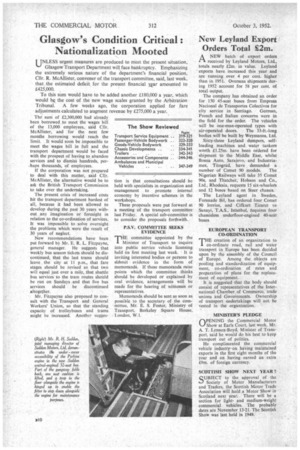Glasgow's Condition Critical : Nationalization Mooted
Page 44

If you've noticed an error in this article please click here to report it so we can fix it.
FINLESS urgent measures are produced to meet the present situation, I's Glasgow Transport Department will face bankruptcy. Emphasizing the extremely serious nature of the department's financial position, Ur. R. McAllister, convener of the transport committee, said, last week, that the estimated deficit for the present financial Kear amounted to £425,000.
To this sum would have to be added another £180,000 a year, which would be the cost of the new wage scales granted by the Arbitration Tribunal. A few weeks ago, the corporation applied for fare adjustments calculated to augment revenue by £275,000 a year.
The sum of £2,300,000 had already been borrowed to meet the wages bill of the 13,000 employees, said Cllr. McAllister, and for the next few months borrowing would reach the limit. It would soon be impossible to meet the wages bill in full and the transport department would be faced with the prospect of having to abandon services and to dismiss hundreds, perhaps thousands, of employees.
If the corporation was not prepared to deal with this matter, said Clir, McAllister, the alternative would be to ask the British Transport Commission to take over the undertaking.
The present crisis of increased costs hit the transport department hardest of all, because it had been allowed to develop during the past 30 years without any imagination or foresight in relation to the co-ordination of services. It was impossible to solve overnight the problems which were the result of 30 years of neglect.
New recommendations have been put forward by Mr. E. R. L. Fitzpayne, general manager. He suggests that weekly bus season tickets should be discontinued, that the last trams should leave the city at 11 p.m., that fare stages should be revised so that two will equal just over a mile, that shuttle bus services to the tram routes should be run on Sundays and that live bus services should be discontinued altogether.
Mr. Fitzpayne also proposed to consult with the Transport and General Workers' Union, so that the standing capacity of trolleybuscs and trams might be increased. Another sugges tion is that consultations should be held with specialists in organization and management to promote internal economy by incentive schemes in the workshops.
These proposals were put forward at a meeting of the transport committee last Friday. A special sub-committee is to consider the proposals forthwith.
P.S.V. COMMITTEE SEEKS EVIDENCE
TIIE committee appointed by the Minister of Transport to inquire into public service vehicle licensing held its first meeting last week. It is inviting interested bodies or persons to submit evidence in the form of memoranda. If these memoranda raise points which the committee thinks should be developed or explained by oral evidence, arrangements will be made for the hearing of witnesses or representatives.
Memoranda should be sent as soon as possible to the secretary of the committee, Mr. E. S. Foster, Ministry of Transport, Berkeley Square House, London, W.1,




















































































































































